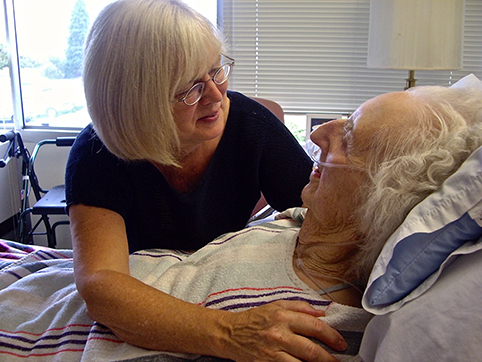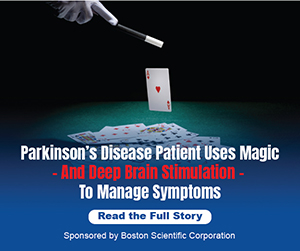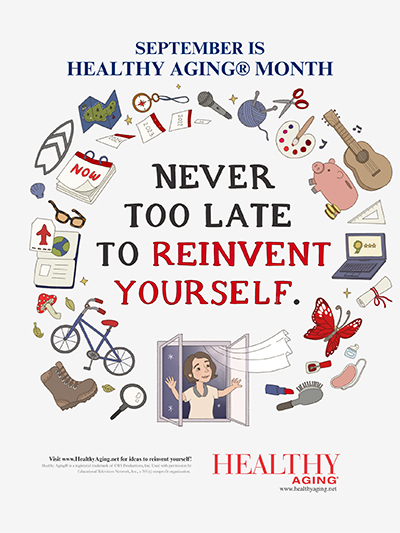
Johanna and Fervid. Photo: Dale Trimble
By Johanna Trimble with Shannon Brownlee
In 2003, my husband and I went to visit his 87-year-old mother, Fervid, and we knew something was wrong. Fervid had been living independently in a senior’s complex for many years and had shown no signs of mental decline. Now, she was confused, delusional, and agitated.
Over the next few weeks, her condition got worse. At some visits, Fervid was unable to recognize her children or could not be roused from a nap. We learned that she had been placed on several new medications while in the health care center following a bout with the flu and dehydration. Some of the drugs were not recommended for older adults. In total, she was now on nine medications, a number the medical staff referred to as “not very many.”
After doing some research, we strongly suspected that the new medications were causing Fervid’s sudden symptoms. After a meeting with her medical team, several drugs were discontinued and her condition monitored. Within six weeks, her cognitive function returned to normal. She lived for another four years, able to enjoy family events, activities at the care center, her 90th birthday, and many wise and deeply appreciated conversations which became her legacy. Had we not intervened, she would likely have died never recognizing family members again, and that would have been our last memories of her.

Photo: Deposit Photos
Overly Medicated As We Age
Fervid’s story is far from rare. Harm from multiple medications has become alarmingly common among older adults and should be a primary concern for family members and caregivers. Every day, 750 adults age 65 and over in the U.S. are hospitalized because of a serious side effect caused by one or more medications. These side effects—clinically described as “adverse drug events”—can range from fatigue, weakness, dizziness, confusion, and nausea, to more debilitating harms such as cognitive decline, internal bleeding, falls, and even death.
Taking more medications puts older adults at a greater risk of harm. According to an April 2019 report from the Lown Institute, a nonprofit health care think tank, each additional drug increases one’s chances of an adverse drug event by 7 to 10 percent. Older adults taking five or more medications are 88 percent more likely to suffer an adverse drug event, compared to those taking one or two drugs.
Not only do more medications increase the risk of an adverse drug event, they can also be overwhelming for older adults and caregivers to manage. Ironically, when patients are overburdened by prescriptions, they may neglect critically important drugs, which can lead to a deterioration in health and a decline in quality of life.
Despite the risks of multiple medication use, older adults are taking far more medications than they were a few decades ago. More than 40 percent of older adults take five or more prescription medications—triple the rate in the mid-1990s. Including over-the-counter drugs and supplements, 67 percent of older adults take five or more medications.
The prevalence of medication overload has hit epidemic proportions. While public health organizations in the U.S. have sounded the alarm on opioid overuse, Americans are largely unaware of the scale of harm that can hit older adults who are on too many medications, even when taken as prescribed by a doctor. According to a recent survey from the John A. Hartford Foundation, half of older adults and 45 percent of caregivers are not aware that older adults should avoid certain medications, such as anti-anxiety drugs, sleep aids, over-the-counter anti-allergy medications, and certain diabetes medications.
How to Reduce Medication Overload
Fortunately, patients, families, and caregivers can take steps to reduce medication overload. If your loved one suddenly begins experiencing new symptoms, such as fatigue, dizziness, confusion, or cognitive decline, find out if they have experienced a medication change. Their symptoms may be caused by something as simple as a new blood pressure medication, anti-allergy medication, or sleep aid. These drugs, while commonly used, often result in harmful side effects, because older adults are less able to process medications than younger adults.
Family caregivers who believe their loved one is taking too many medications, or notice unusual new symptoms, should ask their loved one’s medical team for a “prescription checkup.” During this visit, caregivers should bring along all of the patient’s medications to review what they are for and if the doses can be reduced or eliminated.
The best way to prevent harm from medication overload is to avoid taking unnecessary
medications in the first place. The Lown Institute recommends that when accompanying a loved one to the doctor, family members and caregivers ask the following questions to prevent medication overload:
● What is this medication for?
● How many patients like me benefit from taking this medication and how large is the benefit?
● How many patients like me experience harms from taking this medication and what are the potential harms?
● How will we know when the medication is working or not working?
● When should I stop taking this medication?
● Can I start on a lower dose and see if that works?
● Are there side effects I should watch out for if I take this medication?
In January 2020, the Lown Institute is releasing a national action plan to address medication overload. Among the primary recommendations is to increase awareness of the risks of medication overload among health care providers, family members, and patients. Medication has many benefits, but it also carries grave risks. This Family Caregivers Month, let’s reduce those risks.












